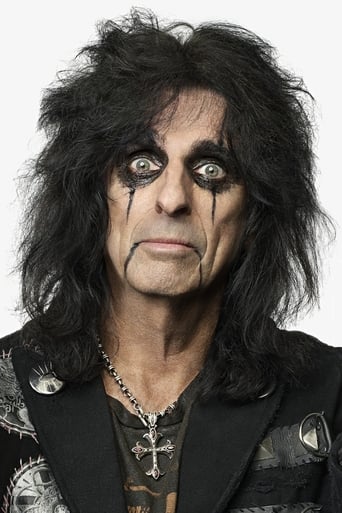Spidersecu
Don't Believe the Hype
Aneesa Wardle
The story, direction, characters, and writing/dialogue is akin to taking a tranquilizer shot to the neck, but everything else was so well done.
Philippa
All of these films share one commonality, that being a kind of emotional center that humanizes a cast of monsters.
Janis
One of the most extraordinary films you will see this year. Take that as you want.
SnoopyStyle
Sam Dunn grew up as a Heavy Metal loving teenager in the 80s in Victoria, British Columbia. At university, he studies anthropology and research various cultures. He decides to do a documentary studying the unique culture of Heavy Metal music.This is a well thought out academic dissection of this subculture. It's informative and compelling. The subject may be too much for one movie. Some bands deserve a movie just for themselves. This is covering a whole genre of music over decades in many countries. It's also covering specific issues with this genre like sexuality, satanism, religion, censorship and women. The movie takes on a lot and generally does it well. It may be a good idea to concentrate on one point or one idea or one person. The genre is so big that the movie ends up feeling a bit scattered. It's an interesting introduction for non-fans and a defense of the genre from a die-hard fan.
camdenam
I wanted to watch this documentary because out of the blue one day I became immensely curious as to how many people actually listen to death metal and black metal and also why they chose to do so. I tend not to like the more extreme metal bands, though unlike many people, who have very strong reactions either way, I've always been the unusual case of a fence-sitter, not opposed to it in anyway but not in love with it either. For instance I really don't mind Iron Maiden, Black Sabbath, and even It Dies Today, All That Remains, and Mastodon and was even leaning in a metalhead direction in my younger days, but I guess I just never "got" the whole death growl, satanic, gory imagery "thing." But the question I was after, and which I think this film answers, is what draws people to the most extreme and controversial representatives of the genre, like Scandinavian black metal and bands like Cannibal Corpse. On the one hand it confirmed my suspicion that much of the scene (like Slipknot and Gwar) is tongue in cheek and not overly serious; just pageantry, entertainment, and playful provocation of the mainstream. Many of these bands seem to nurture a culture of envelope-pushing, and the market just encourages this, rewarding those that shock and awe just as much as it does in other industries. But the film also reveals a deeper truth that was really at the heart of it, and that is the sense of power, freedom, escape, and belonging that the music offers and which "outsiders" feel especially drawn towards. Its not so much the music or the lyrics that appeal as much as it is the big "f**k you" that it all represents and which empowers the listener with that shared feeling of resistance. In short this film provided an excellent and accessible analysis of the genre, with deep insights into the psychology, sociology, and anthropology of its practitioners and followers. And of course the perfect person to do it is our narrator, an avid metalhead and anthropologist, whose obvious enthusiasm for every interview and festival he goes to almost makes you wish you were a die-hard metalhead too.
fourtwentylove
Like other reviews I agree that this film is preaching to the converted and well... what can I say people enjoy being acknowledged, hence the good reviews. But as a "documentary" it lacked A LOT of real information. I certainly did not learn anything new (except that cradle of filth is now being considered Norwegian black metal - i mean who made these categories? Is it sloppiness or lack of knowledge?) and I'm not sure non-metal heads would learn much either. I have a real problem with the gender/sexuality bit- the word sexism was thrown out but not used in a single coherent thought... the only all female metal band they covered is girlschool! really? I would have appreciated hearing more of an intelligent analysis or theory of why metal either is or perceived to be a male, heterosexual and WHITE genre. Maybe that's asking too much but therein lies the problem of this doc. Its too ambitious- tries to explain the whole culture and history of metal in 90 minutes! It clearly lacked focus and would have done much better honing in on a particular area but that would require more research instead of jerking off every interviewee... however maybe this film has inspired and opened doors for future film makers to really explore various nuisances in the metal scene... one can only hope.
fedor8
Sam Dunn seems like a typical metal fan; long hair, the now obligatory "vagina beard" (pseudo-goatie), headbangs in the first rows, over-worships the bands that he listens to, wears black shirts of his favourite bands, and does the silly devil sign at every opportunity. In other words, he confirms the stereotype of the somewhat clownish metal fan, which is to the most part true. On the other hand, the fact a typical fan would make a documentary about it has its advantages.Dunn's more-or-less wide-eyed tour of the history of metal is an interesting one, but mainly due to the fact that he interviews several note-worthy people from (and outside) the scene. As a source of information this documentary is incomparably more useful to the uninitiated. Personally, there was very little new here for me. To people unfamiliar with metal, this movie might dispel many clichés/prejudices/falsehoods that have existed since its "inception". Likewise, the movie will confirm some; hormone-driven kids/fans screaming "metal rules!" and "yeahhhh!" probably do this more than anything.People like Lemmy, Snider, Iommi, Dickinson, Cooper, Dio, Dennis D'Amour, or Araya - regardless of the fact that some of them made rather bad music (hint: glam rock) - deserved to be given a chance to say one or two things about the subject, and the bits with them were alternately humorous and revealing, though not in any way shocking, while the parts with the newer-generation musicians came off as rather uninteresting and phony (Lamb of God, Slipsnot) or merely laughable/pathetic - hence perhaps amusing for all the wrong reasons (the Norwegian black metal morons section). Listening to those untalented nu-metal idiots from Slipsnot self-importantly rant about graveyards and "Republican puritans" was in stark contrast to the more relaxed, casual approach that the veterans have. And anyway, someone ought to tell that cretinous Slipknotian singer that Al and Tipper Gore, who feature prominently in the anti-metal/censorship-movement section, are Democrats and not Republicans, hence that censorship is bi-partisan and not right-wing. Fortunately, however, there was no major attempt by Dunn to try to link metal in any way with left-wing liberalism or Socialism. I suppose the idea of having a few sociologists and a musicologist have their say had its advantages, as well, although what came out of the mouth of the musicologist was far more interesting (and reality-based) than what sociologists had to say. ("Sociology": the study of the bleedin' obvious.) I liked Dunn's categorization of various metal genres and sub-genres (although I needed the pause button to have a proper look at it), and even though he pretty much got it right, there were a few slip-ups here and there: Sodom should have been in the "thrash" category and not listed under "death metal"; Judas Priest and Accept are heavy metal not "power metal" (which is a problematic term), whereas Helloween is merely "ultra-crap metal"; Rainbow and Dio are a mix of hard rock and early heavy metal, and have nothing to do with power metal; GBH isn't so much hardcore as it's punk; Ratt should be filed under "glam metal" (although "pop metal" isn't a bad term for that crap either); Machine Head are a mix of nu-metal and thrash and NOT "metal core"; in fact by "metalcore" Dunn must have meant "crossover" which is what the Suicidal Tendencies and D.R.I. really are; Merciful Fate has nothing to do with black metal, except thematically, but as we "all" know these categories are much more music- than lyrics/image-orientated; Biohazard isn't nu-metal by any stretch of the imagination - it is 3rd-generation hardcore; Prong is a bit out of place in the "hard alternative" section, because it is a mix of progressive metal and industrial music. I also had problems seeing the unique Voivod grouped together with a poppy band like Rush; Voivod could just as well have been placed under "thrash" rather than share a category with their overrated and very soft Canadian fellow countrymen. All in all, nothing revolutionary, merely a good, rather solid way to spend 90 minutes.For my music commentary, go to: http://rateyourmusic.com/collection/Fedor8/1




